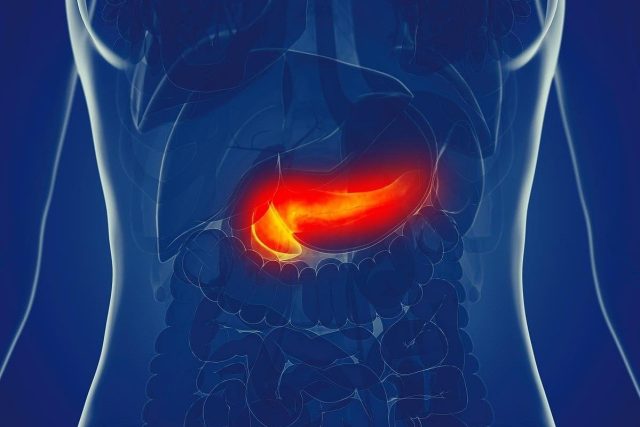In recent study, PAC-MANN identified pancreatic ductal adenocarcinoma samples with 98 percent specificity and 73 percent sensitivity across all stages
By Elana Gotkine HealthDay Reporter
FRIDAY, Feb. 28, 2025 (HealthDay News) — A rapid nanosensor assay that measures serum protease cleavage of a target-probe nanosensor can identify pancreatic ductal adenocarcinoma (PDAC) samples with high specificity and sensitivity, according to a study published in the Feb. 12 issue of Science Translational Medicine.
Jose L. Montoya Mira, Ph.D., from Oregon Health & Science University in Portland, and colleagues developed a noninvasive detection assay for PDAC based on serum protease activity. A series of protease-cleavable peptide probes was screened for the discrimination of PDAC samples versus healthy controls and noncancerous pancreatic disease (110, 170, and 76 patients, respectively).
The researchers identified a single matrix metalloproteinase-sensitive probe that could distinguish PDAC from controls with 79 ± 6 percent accuracy. This probe was further developed into a rapid magnetic nanosensor assay (PAC-MANN-1), which measures serum protease cleavage of a target-probe nanosensor using a fluorescent readout. The probe cleavage signal was reduced by 16 ± 24 percent after surgery in a longitudinal cohort of patients undergoing surgical removal of the primary tumor. In a blinded retrospective study, PAC-MANN identified PDAC samples with 98 percent specificity and 73 percent sensitivity across all stages and distinguished 100 percent of patients with noncancerous pancreatic disease versus patients with PDAC. The combination of the PAC-MANN assay with the clinical biomarker carbohydrate antigen 19-9 yielded sensitivity of 85 percent for detection of stage I PDAC, with specificity of 96 percent.
“PAC-MANN-1 has promise to serve as the foundation for a sensitive, inexpensive, low serum volume and scalable early detection of PDAC assay that can be used regularly in high-risk patient populations or the general population with less access to medical tests,” the authors write.
Several authors disclosed ties to the biotechnology industry.
Copyright © 2025 HealthDay. All rights reserved.



















